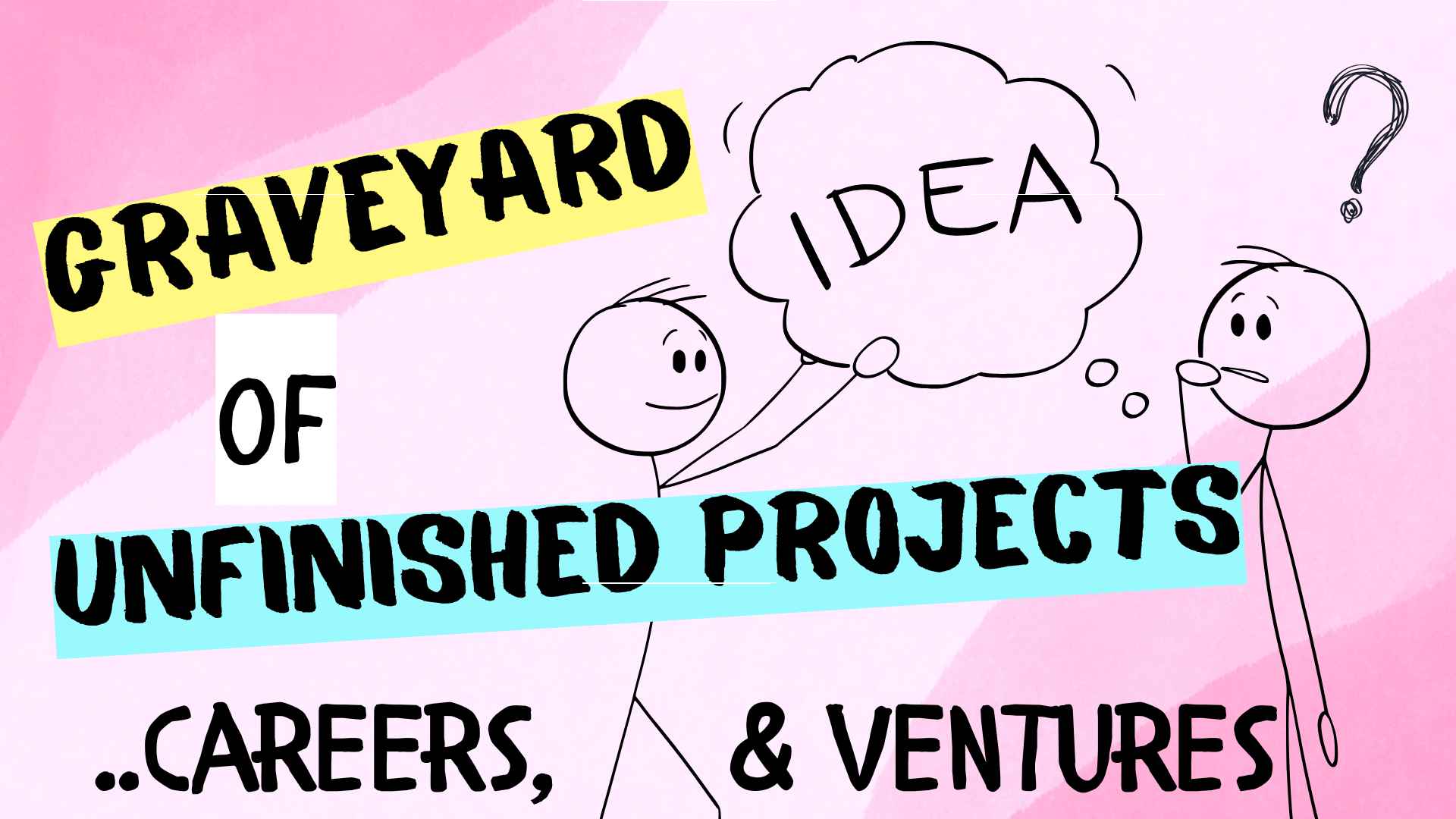The Graveyard of Unfinished Projects: When Our Family Ditches Us

Ugh! You want to start another project, change your major, change your career. But by now, your family has ditched you. Your famous track record of not finishing anything has caught up with you. What can you do when you feel you no longer can ask your family to stand behind you one more time?
Table of Contents
- Differentiating Between Fleeting Interests and the Real Deal
- When Our Family Loses Faith in Us
- Example Discussions to Have With Doubting Family:
- Facing Our Own Self-Doubt
- Final Thoughts
Differentiating Between Fleeting Interests and the Real Deal
ADHD coach Jaye Lin says, “We have a tendancy to go hard on approaching new interests or hobbies, then lose interest and move on to another one… Many of us drop hobbies that we were so sure we would do the rest of our life.”
Approaching a new interest tends to be with more intensity for those of us with ADHD. According to Ms. Lin, we get our highest hit of dopamine when dreaming of new ideas and possibilites. When the interest fades, so does the dopamine.
I humorously refer to this as “misguided enthusiasm” but the allure for dopamine is real.
We might naturally think we can be employed or monetize our new skill. If we start comparing ourselves with others, and we realize we’re not so wonderful as we thought, it can be an instant off switch. Things like praise can help us to get to the next level.
The thing is, many of us with ADHD are always trying to turn our hobbies into something that can make money with and live off of.
You need to step back and realize, it’s the thrill of the chase we’re after: the research, the creative process, the anticipation of the end results, and the development of new skills. If expectations come into play, our brain predictably knows that the good times are over, and we abandon the venture.
The end result: we feel guilty and ashamed of our graveyard of unfinished projects and ventures. This guilt can be reduced by approaching with a “try before you buy” – borrowing supplies, and starting small before completely committing to a pricey investment. We can always buy what is needed with the next level of the hobby, and the next.
Setting a “fun budget” can give permission to explore a hobby, but within the limits of a financial budget. Passing on the supplies can benefit another person who shows interest in it.
In the end, we have a richer self because of trying many different things.
If we can look at the new shiny object through the lens of a dopamine hit, we can tell the difference between a passing phase, and our life’s purpose.
When Our Family Loses Faith in Us
“I am afraid that my family will make fun of me, saying ‘Again? Don’t you remember what you tried the last time??’ This chance might be the difference between finally experiencing success versus regrets of a lifetime. Because of their doubt, I’m afraid to even try.”
If you’re like many ADHDers, you have a higher rate of trying out different things in life than the neuro-typical crowd. It’s our natural curiosity and cross-jumping interests.
I hear you—when you know there’s a risk of judgment from family, investing in yourself can be tough. But let’s talk about it.
Your dream may not be totally random; if it’s something that genuinely excites you, it’s worth honoring. If you never take the leap, those “what ifs” might haunt you more than any comment your family could make. Regret for not trying tends to be louder than regret from a failed attempt.
It’s natural to worry about what your family will say. People sometimes mock things they don’t understand or things that challenge their perspective on life. If they’ve never seen someone start a venture and thrive, they might dismiss it. That doesn’t mean their opinion is right—it just means they’re seeing the world through their own lens.
Overcoming Family Doubt
You could start small, testing the waters. If you wanted to start a Youtube channel, you could do so without making it too public right away. Create a few videos, see how you feel, and get comfortable. If you gain traction or simply enjoy the process, you’ll have more confidence when talking to your family about it.
If they do react negatively, remind yourself that their opinion doesn’t define your success. Tons of creators/dreamers face skepticism at the beginning. The ones who push past it are the ones who make something great. At the end of the day, this is your journey, not theirs.
Marie Wendt talks about the difference between constructive criticism/concern and active discouragment from family. The latter can adversely affect the success of an entreprenuer’s goal. Even if your family doesn’t full understand what you are doing, they can still support you.
Anticipate Concerns From Family
If you still feel the friction of family giving you a hard time, anticipate their concerns before talking with them. Are they worried about the time commitment? Financial investment? Privacy? Stability? Understanding what might bother your family members can help you prepare to address those worries with reassurance and a clear plan.
You might start the conversation by expressing why this matters to you—not just as a hobby, but as something that excites you and could lead to new opportunities. Sometimes, when people hear the passion behind a decision, they’re more open to supporting it.
Sometimes, when people hear the passion behind a decision, they’re more open to supporting it.
-Renee’s Rabbit Hole
If their initial reaction is negative, don’t assume it’s the final verdict. Change often makes people uncomfortable, but that doesn’t mean they won’t come around. Consider setting boundaries—maybe you start your venture on a small scale, prove that it’s sustainable, and show your family that it’s not interfering with your relationship or responsibilities.
At the end of the day, your dreams are valid, and it’s okay to want something for yourself. Have you ever talked to your loved ones about your long-term aspirations? That conversation might help you frame things in a way that resonates more with them.
If your family still remains skeptical, then waiting for their approval might keep you stuck indefinitely. Here’s the thing—you don’t need their belief to succeed. Would it be nice? Absolutely, but you can’t hold up your own dream based on their hesitation.
Feeling unsupported by someone who’s supposed to be in your corner can be tough. Skepticism can sometimes come from a place of caution, but when it consistently leads to dismissal rather than constructive conversation, it can be discouraging.
You don’t need to prove yourself to them; you only need to show up for yourself. Sometimes, people start taking things seriously once they see results, but even if they never do, that doesn’t mean you should stop doing what excites you.
That feeling—finally stepping into something that truly resonates with you—is so important to your truth.
-Renee’s Rabbit Hole
That feeling—finally stepping into something that truly resonates with you—is so important to your truth. If you have a dream in progress, focus on the joy it’s bringing you—it’s proof that this isn’t just some passing thought. This is real, and it matters.
Instead of focusing on justifying what you’re doing, consider framing it as simply sharing your truth. You’re not asking for permission—you’re communicating something that’s deeply meaningful to you.
Example Discussions to Have With Doubting Family:
You might start a difficult disscussion with something like:
“I know you may not fully understand this, but I’ve started [my dream], and it feels incredible. For the first time, I feel like I’m doing something that aligns with who I am. This isn’t about disregarding our life together—it’s about allowing myself to pursue something that makes me feel fulfilled.”
OR
“I’m investing in my retirement, this project could bring in income I wouldn’t otherwise have. If it isn’t successful, it would still give me personal satisfaction.”
Positioning this as an investment in your retirement makes it less about a hobby and more about long-term security and fulfillment. It shows that you’re thinking ahead and considering both financial possibilities and personal satisfaction.
Your family might challenge the financial aspect, but that doesn’t mean you have to prove financial success upfront. The important takeaway is that even if income isn’t guaranteed, this project still adds value to your life. Sometimes, fulfillment leads to success in unexpected ways.
If your family is more concerned about time or effort, you might emphasize that this project is bringing you joy, which is just as valuable as financial gain. Happiness and purpose are huge parts of retirement planning, and this allows you to craft something meaningful instead of simply waiting for the next phase of life to happen to you.
You’re laying the foundation for something that feels right—regardless of external opinions.
Success is about knowing that you’re giving yourself permission to do what you love, regardless of outside approval.
Facing Our Own Self-Doubt
Being scared is understandable when your family has lost confidence in you. It’s even worse when you know your past history: you have a record on not following through.
ADHD can make it harder to stick with long-term projects, but it doesn’t mean you’re incapable of success. Your creativity, hyper-focus when you’re interested, and ability to think outside the box can actually make you great at things like content creation on that Youtube channel you’re thinking about.
Here’s an idea: Don’t worry about being perfect; just prove to yourself that you can start and finish something. Then do another. Small wins build momentum.
If your family has seen you start things and not finish them before, their skepticism may come from a place of concern rather than pure doubt in you. But the only way to rebuild confidence—both theirs and yours—is through action.
You could also structure your approach to set yourself up for success. Maybe you plan ahead so ideas don’t feel overwhelming later. Or you schedule time each week dedicated just to working on your project. Finding systems that work with your ADHD instead of fighting against it can make a huge difference.
Another approach: accept the way your brain is wired. It’s OK to have 2-3 projects going at any time, and rotating through them as interest rotates.
For myself, I was trying a long time to publish a successful website, but I was listening to all the experts. When I stepped into my ADHD strengths, the flow happened, and success followed. Might I add, my creative ideas are bursting more than ever before, because I learned from past failures and unlocked what works best for my brain.
ADHD can make it harder to stick with long-term projects, but it doesn’t mean you’re incapable of success.
-Renee’s Rabbit Hole
Final Thoughts
That feeling—like time is slipping away for your dreams to come true—is so real. But let me tell you something: you’re not out of time. You’re stepping into a moment where you’re finally embracing what feels right for you, and that’s incredibly powerful.
Pushing through your family’s reaction won’t be easy, but it’s clear that this means more to you than just another fleeting idea. You’re determined, and that determination is going to carry you forward—even if it’s uncomfortable at first.
Success isn’t about proving something to your family or anyone else. It’s about knowing that you’re giving yourself permission to do what you love, regardless of outside approval. That desperation you feel? Maybe it’s not just fear—it’s also the drive that will push you past hesitation and into action.
#inthistogether -Renee




